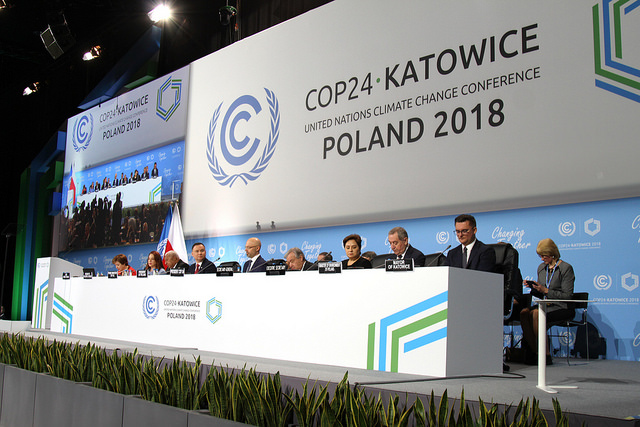T 07804 059426 E admin@operationnoah.org
Posted in:
Comment
Date posted: 5 December 2018
As the latest UN climate conference gets underway in Poland, we run through some of the key issues to look out for. If you’re wondering what the terms ‘Just Transition’ or ‘People’s Seat’ might mean, read on…

Photo credit: UNclimatechange, Flickr
Politicians, businesses, NGOs and activists have in recent days descended on the southern Polish city of Katowice for the annual ‘Conference of the Parties’, or COP.
This is the 24th summit so far (hence ‘COP24’), and although the two-week-long series of negotiations is unlikely to attract as much attention as the higher-profile ones which take place every five years, it’s no less important for that.
The Paris Agreement, signed in 2015, has now been ratified by more than 180 countries, but by the time it comes fully into force in 2020, countries need to have decided on a set of rules to govern the treaty.
That’s what this summit is essentially about: how to put the lofty ambitions of the Paris Agreement into practice, measuring progress in the years to come and ensuring countries stick to their pledges.
There are fears, though, that this framework may not be completely worked out in time, after an additional interim session held in Bangkok in September failed to make sufficient progress. Negotiators will be working hard to succeed this time around.
Most now agree that coal, as the dirtiest fossil fuel, needs to be phased out as fast as possible if we are to have any chance of averting the worst impacts of climate change.
The UK has very nearly achieved this over the past few decades, with coal generating just 5% of UK energy last year, and it’s now one of the leading countries in the ‘Powering Past Coal Alliance’. After launching at last year’s COP in Bonn to help drive the global transition away from coal, this global coalition will be looking to make an impact in Katowice.
Their message will not be well received by some, though, in a region – and country – still heavily dependent on the fossil fuel. The country’s energy minister made sure to defend the energy source ahead of the talks, claiming it had a continuing role to play and could be ‘clean’.
His statement was quickly dismissed by the COP24 presidency which is co-ordinating the summit, but the influence of the pro-coal lobby, recently announced as being among the sponsors of this year’s talks, is still a cause for concern.
The idea of a ‘just transition’ has long been used by the climate change and trade union movements to emphasise the need to plan the move away from fossil fuels in a way that supports workers in these industries and avoids people being ‘left behind’.
Scotland has recently established a ‘Just Transition Commission’ while Spain has struck a deal with coal mining unions, compensating for the closure of mines and reskilling workers for the future.
The concept has now gone global, with ‘Just Transition’ having been chosen as one of the key themes for this year’s COP.
While there are concerns that pro-coal countries such as Poland may try to use the idea as a means of slowing down climate action, rather than speeding it up, there is real potential for this approach to help accelerate the shift to a clean economy.
One interesting innovation at COP24 is the creation of a ‘People’s Seat’ to provide a bridge between the public and negotiators.
David Attenborough, who has been appointed to the position, has already made some strong statements about the urgency of tackling climate change, saying: ‘Right now, we are facing a man-made disaster of global scale. Our greatest threat in thousands of years.’
By contrast, the space being given to civil society and grassroots activists is likely to be more restricted than usual.
While climate summits have become famous for attracting large-scale demonstrations from activists demanding greater action, the Polish government has banned all ‘spontaneous’ protests in Katowice during the talks, as well as issuing a terrorism alert.
Despite this mixed picture, there is hope that the recent UN climate report, which spells out the hugely increased impacts of breaching a 1.5°C global average temperature rise, will help focus COP attendees’ minds on the enormous task ahead.
Richard Collett-White